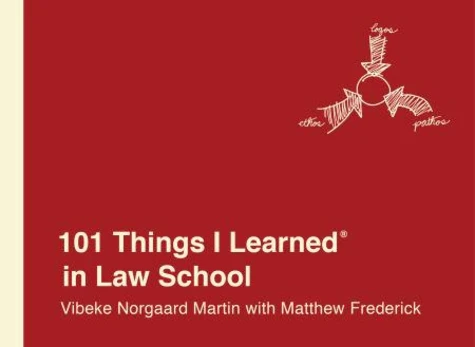101 Things I Learned® in Law School
Par : ,Formats :
Disponible dans votre compte client Decitre ou Furet du Nord dès validation de votre commande. Le format ePub protégé est :
- Compatible avec une lecture sur My Vivlio (smartphone, tablette, ordinateur)
- Compatible avec une lecture sur liseuses Vivlio
- Pour les liseuses autres que Vivlio, vous devez utiliser le logiciel Adobe Digital Edition. Non compatible avec la lecture sur les liseuses Kindle, Remarkable et Sony
- Non compatible avec un achat hors France métropolitaine
 , qui est-ce ?
, qui est-ce ?Notre partenaire de plateforme de lecture numérique où vous retrouverez l'ensemble de vos ebooks gratuitement
Pour en savoir plus sur nos ebooks, consultez notre aide en ligne ici
- Nombre de pages216
- FormatePub
- ISBN978-1-5247-6203-2
- EAN9781524762032
- Date de parution06/08/2019
- Protection num.Adobe DRM
- Taille41 Mo
- Infos supplémentairesepub
- ÉditeurCrown
Résumé
A provocative, accessible, and cleverly illustrated guide to legal principles and practice, by a law instructor and internationally experienced attorneyThis might be the most useful book law students ever read. Not because it contains the details of case law, but because it teaches them how to think like a lawyer. From the fundamentals of effective argument to the principles, structures, and assumptions underlying our legal system, 101 Things I Learned® in Law School makes the impenetrable clear and the complex understandable.
Illustrated lessons summarize landmark cases and illuminate a fascinating range of questions, including: . What is the difference between honesty and truthfulness?. Why is circumstantial evidence often better than direct evidence?. How does one find the proper sources to substantiate a legal argument? . Why do states deliberately pass unconstitutional laws?. How can testimony from a hostile witness be helpful?Written by an internationally experienced attorney and law instructor, 101 Things I Learned® in Law School is a concise, highly readable resource for law students, graduates, professionals, and anyone else fascinated--or confused--by our legal system.
Illustrated lessons summarize landmark cases and illuminate a fascinating range of questions, including: . What is the difference between honesty and truthfulness?. Why is circumstantial evidence often better than direct evidence?. How does one find the proper sources to substantiate a legal argument? . Why do states deliberately pass unconstitutional laws?. How can testimony from a hostile witness be helpful?Written by an internationally experienced attorney and law instructor, 101 Things I Learned® in Law School is a concise, highly readable resource for law students, graduates, professionals, and anyone else fascinated--or confused--by our legal system.
A provocative, accessible, and cleverly illustrated guide to legal principles and practice, by a law instructor and internationally experienced attorneyThis might be the most useful book law students ever read. Not because it contains the details of case law, but because it teaches them how to think like a lawyer. From the fundamentals of effective argument to the principles, structures, and assumptions underlying our legal system, 101 Things I Learned® in Law School makes the impenetrable clear and the complex understandable.
Illustrated lessons summarize landmark cases and illuminate a fascinating range of questions, including: . What is the difference between honesty and truthfulness?. Why is circumstantial evidence often better than direct evidence?. How does one find the proper sources to substantiate a legal argument? . Why do states deliberately pass unconstitutional laws?. How can testimony from a hostile witness be helpful?Written by an internationally experienced attorney and law instructor, 101 Things I Learned® in Law School is a concise, highly readable resource for law students, graduates, professionals, and anyone else fascinated--or confused--by our legal system.
Illustrated lessons summarize landmark cases and illuminate a fascinating range of questions, including: . What is the difference between honesty and truthfulness?. Why is circumstantial evidence often better than direct evidence?. How does one find the proper sources to substantiate a legal argument? . Why do states deliberately pass unconstitutional laws?. How can testimony from a hostile witness be helpful?Written by an internationally experienced attorney and law instructor, 101 Things I Learned® in Law School is a concise, highly readable resource for law students, graduates, professionals, and anyone else fascinated--or confused--by our legal system.



